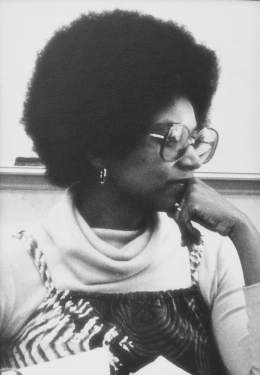224 pages, Interviewed by Sarah Rabkin; Edited by Sarah Rabkin and Irene Reti, 2015. Photo by M.A. Stroud, 1978
Carolyn Martin Shaw joined the UCSC faculty in 1972, hired by the anthropology department and Kresge College, where she served as provost from 1991 to 1996. In selecting Professor Martin Shaw in 2004 for the Dean McHenry Award for Distinguished Leadership in the Academic Senate, the Committee on Committees noted her “intelligent, imaginative, indefatigable, and principled work to create…communities of scholarship and learning characterized by openness, fairness, and respect.” Martin Shaw’s abiding interest in the nature of human community and her dedicated efforts to help build robust communities at UCSC emerge as running themes throughout her oral history.
UCSC in the early 1970s presented her with other kinds of foreignness as well, in its whiteness and in the economic privilege enjoyed by many of its students. Landing in what was “really a world that I’m not familiar with,” Martin Shaw responded by rolling up her sleeves with curiosity, clear-sightedness, and a sense of civic responsibility: “Well, let me see what this world is like. …I’ve entered into a contract, and you’ve done so with me, and we’ve got to figure out a way to talk to each other.”
This attitude characterizes her discussion of many community-building challenges she engaged over the years at UCSC, in college, departmental, campus and system-wide contexts: identifying unrecognized power imbalances in Kresge’s purportedly liberating and egalitarian “touchy-feely” early culture (whose salubrious innovations she champions even as she critiques its problems); cultivating a supportive campus environment for students of color and other historically disenfranchised groups; navigating contentious periods in the evolution of the anthropology department and women’s studies program; developing sensitive and effective policies for addressing sexual harassment; obtaining faculty recognition for the dignity of staff labor and attention to the service of non-senate faculty; achieving senate support for a bold plan to revitalize the colleges as sites of academic endeavor; attempting to reduce the administration’s use of police force to quell student demonstrations.


 Santa Cruz, CA
Santa Cruz, CA



